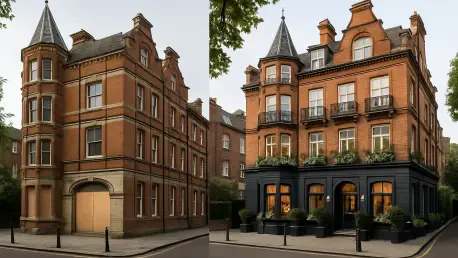How does a forgotten building in the heart of one of the world’s most vibrant cities get a second chance at life? In London’s bustling West End, a once-neglected structure is being reborn as a boutique hotel, thanks to the bold vision of a German hospitality brand. This transformation isn’t just about bricks and mortar; it’s a story of ambition, cultural revival, and the relentless pursuit of excellence in a fiercely competitive market. Picture the energy of Theatreland, where history and modernity collide, now set to welcome a new landmark that promises to captivate travelers and locals alike.
A Forgotten Gem Reawakened
Tucked away at 41 Kingsway, Waterman House has stood empty for nearly a decade, a silent relic of a bygone era. Now, AMANO Group, a Berlin-based hospitality innovator, is stepping in to rewrite its narrative. The acquisition of this nine-story, 25,000-square-foot property marks a significant milestone for the brand as it establishes a stronger foothold in London, building on the success of its nearby Covent Garden flagship.
The importance of this project lies in its potential to redefine a corner of the West End. With a £150 million investment in London, AMANO is not merely renovating a building but contributing to the area’s cultural and economic vibrancy. This development, finalized through a joint venture with Excellion Capital, showcases a rare opportunity to secure a freehold property in a market where such deals are almost unheard of, highlighting the strategic weight of this endeavor.
Strategic Heart of London’s Theatreland
Location is everything in hospitality, and Waterman House sits in an enviable spot. Just 50 yards from Hotel AMANO Covent Garden, it nestles in the epicenter of Theatreland, where the buzz of Covent Garden meets the elegance of The Strand and the intellectual allure of Bloomsbury. This intersection of culture, education, and tourism makes it a goldmine for attracting discerning travelers seeking more than just a place to sleep.
The proximity to AMANO’s first London hotel also offers practical advantages. By managing both properties with a single team, operational efficiencies emerge, from shared staffing to combined amenities like rooftop bars and event spaces. This clustering strategy not only reduces costs but also enhances the guest experience, creating a seamless network of unique offerings in a hyper-competitive landscape.
From Derelict to Dazzling Destination
Waterman House, once a drab office block, is poised for a dramatic makeover into a 70-room boutique hotel. AMANO’s plan includes restoring the building’s architectural heritage while infusing it with contemporary design, a signature approach evident in their Covent Garden property, which has maintained over 90% occupancy since opening. The addition of a ground-floor food retail concept aims to breathe life into the streetscape, making it a hub for both guests and passersby.
This revitalization reflects a broader trend of adaptive reuse in urban centers. Turning underutilized spaces into vibrant destinations is no small feat, yet AMANO has a proven track record. Their conversion of Drury House into Hotel AMANO Covent Garden was completed on time and within budget, setting a high bar for this latest project. The focus on blending history with modernity ensures that the building’s past is honored while meeting the expectations of today’s travelers.
Insights from the Trailblazers
Behind this ambitious transformation are voices of conviction and expertise. Philip Rokeach, AMANO Group Director, emphasizes the driving force behind the expansion: “The overwhelming response from the London market has fueled this next step for the brand.” This sentiment underscores the confidence in their approach, validated by the performance of their first hotel.
Robert Stafler, Director of AMANO UK and Manex Properties, sheds light on the complexity of the deal. “Securing the £20 million freehold property after a 10-month cross-border negotiation was a monumental task, but restoring its heritage into a standout destination is the real thrill,” he notes. Financed entirely by equity through the partnership with Excellion Capital, this acquisition speaks to a strategic boldness that sets AMANO apart in a tight market.
A Blueprint for Urban Hospitality Success
AMANO’s approach to Waterman House offers valuable lessons for hospitality brands navigating urban growth. Prioritizing prime locations near cultural hotspots, as seen in Theatreland, can significantly boost demand. The brand’s focus on areas with high foot traffic and tourist appeal ensures a steady stream of potential guests.
Equally critical is the balance of historical preservation with modern needs. Waterman House will cater to contemporary travelers while retaining its unique character, a tactic that resonates in cities valuing heritage. Additionally, creating synergies between nearby properties—through shared management and amenities—can streamline operations and elevate service quality, a model that other developers might consider replicating in crowded markets.
Looking back, the journey of transforming Waterman House has been a testament to vision and perseverance. The £150 million commitment to London has not only solidified AMANO’s presence but also contributed to the renewal of a key urban area. As the project moves forward, it sets a precedent for how neglected spaces can be reimagined. Moving into the future, stakeholders in hospitality should take note of such adaptive reuse projects, exploring ways to turn overlooked properties into cultural and economic assets. The challenge lies in identifying similar opportunities and applying innovative strategies to create lasting impact in global cities.









